‘But who will take on low-tonnage synthesis — that’s the problem’
At the final meeting of this year, the board of directors of Tatneftekhiminvest Holding identified several more promising technologies that have an applied potential for import substitution
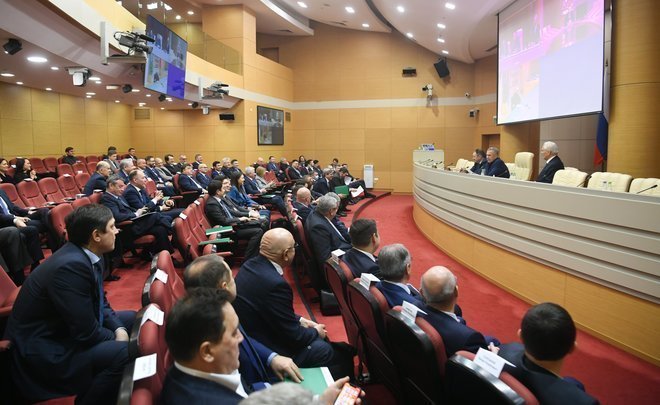
“The gunpowder plant now has a great need (for cellulose — author's note), and we can reach large volumes," Tatarstan President Rustam Minnikhanov called to expand the acreage of hemp at the meeting of the board of directors of Tatneftekhiminvest-Holding JSC on 26 December. In 2023, almost three times more areas have been allocated for it compared to 2019 — 740 hectares. As a result, the authorities want to get a large harvest of the new crop and try to replace Uzbek cotton with it, but everything rests on the “economy”. As usual, developments in the field of supercritical materials deserved special attention, but even here the question was put on the “stop” — there are no domestic monomers. Read the details in the material of Realnoe Vremya.
Developments in low-tonnage chemistry and other projects
At the final meeting of this year, the board of directors of Tatneftekhiminvest-Holding identified several more promising technologies that have an applied potential for import substitution. But this time, perhaps the most favourite topic of Tatneftekhiminvest-Holding CEO Rafinat Yarullin came into focus — developments in low-tonnage chemistry, supercritical technologies, and new materials for rocket, aircraft and shipbuilding. It is clear that with the beginning of the special military operation in Ukraine, interest in these studies instantly jumped, and there is hope that it will not be momentary, and the developments themselves will be crucial for scientific and technological development in general. However, there are few specialised research centres that have preserved the original technical documentation and technical solutions for the rapid launch of products into production.
Dmitry Reznichenko, the director general of the branch Research Institute of elastomeric materials and products, interested the audience in a wide range of applied developments in the production of rubber products and mixtures.
“Science does not survive without production. Therefore, we have presented the areas of work that the country needs," he outlined the purpose of the NIIEMI research programme, adding that the priority is the development of protective equipment and the configuration of manned astronautics and aviation. “The first developments were carried out for the Tupolev family aircraft, and now they are also busy for helicopter equipment.”
According to him, the institute develops not only rubber compounds, but also hoses for cooling systems, shock absorbers. At the same time, the Institute is developing adhesives and sealants, without which it is impossible to ensure the tightness of the structure.
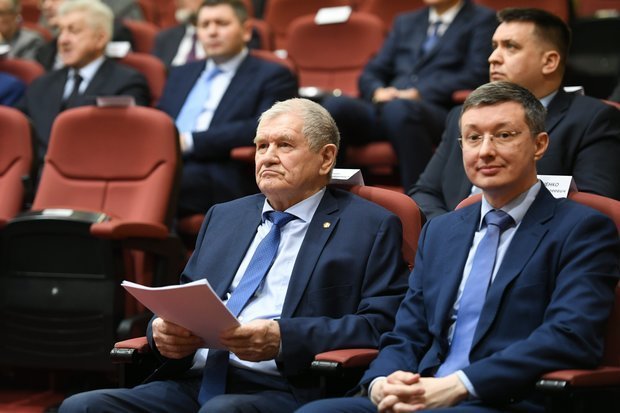
Removing the comma, or How to define the technical policy yourself
Currently, the production of rubbers, polymer materials and sealants in the country is not standardised, the speaker noted. This hinders the purposeful development of the entire industry: from manufacturer to consumer. In his opinion, now is the best time to define your own technical policy.
“Now the Western lobby, which sat in the technical committees and carried out its policy, is gone," he said. “It's time to do standardisation. Not to return those powerful of this world who, by changing one comma, dictated the conditions for which products to produce. This comma should be removed while there is an opportunity.”
Reznichenko complained that the most modern solutions are at the junction of new materials, which the big industry is not ready to switch to yet. And he proposed to unite developers, customers and manufacturers into a single working group. “Now everyone is busy with short-term supplies," he said. “It is important to connect everyone together. Because industry with its own needs, synthetics with its own, the state with its own, and academic science also does not hear," he pointed out the need to overcome disunity. According to him, within the framework of general working groups, it would be possible to focus on solving flagship projects.
The president of Tatarstan supported his initiative and instructed the Ministry of Industry and Trade to gather NIIEMI, as well as aircraft and shipbuilding enterprises into a common group.
“This topic is very important for technological security, besides it is a good business," said Rustam Minnikhanov, adding that similar projects are supported at the federal level.
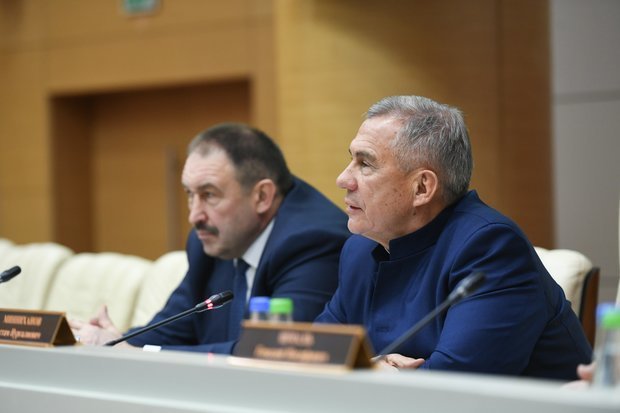
“We don't have monomers. Destroyed everything...”
Sergey Ponomarenko, the director of the Institute of Synthetic Polymer Materials named after N.S. Enikolopov, Sergey Ponomarenko, continued the topic of cooperation between science and production. He made a proposal to create in the republic an expert centre for new high-tech polymer materials made of polyimides, which are necessary in aviation and cosmonautics. Until now, they have been imported from abroad, and after the introduction of sanctions, we have to look for alternative options.
The shortage of a special polyimide film that provides high quality polymer products is of particular concern. Its monopolist is the American company 3M, which has stopped shipments to Russia. According to Ponomarenko, it is possible to launch the production of new supercritical materials from polyimides in the country, but there are no initial monomers.
“We need a large line of different monomers, but not in very large quantities. There is no need for hundreds of thousands of tonnes of these monomers. But who will take on low-tonnage synthesis — that's the problem. We try to interact with the same SIBUR, but they are not interested enough, since the volume is small," he said.
Director General of Tatneftekhiminvest-Holding JSC Rafinat Yarullin added that monomers are a big separate work.
“To get polyethylene, ethylene is needed. To get polyimide, we need to get a very complex chemical compound. Of course, we take Chinese components, but it's still not our own structural polymer, which is needed for rocket science and military aviation equipment. We do not have monomers from which polyimide can be made. Everything has been destroyed...” he put an end to it.
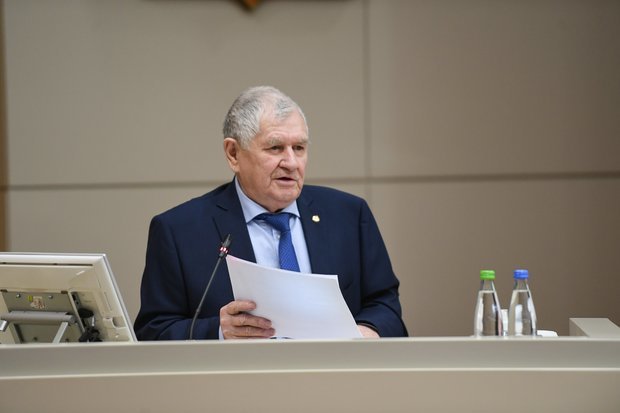
The president of the republic, Rustam Minnikhanov, proposed to pay attention to the development centre of Tatneft.
Hemp is a big hassle for villagers
“It helps some people relax a little," the president joked, giving the floor to the next speaker.
Professor of the Kazan National Research Technological University Timur Deberdeev presented the know-how of obtaining cellulose from hemp, which was banned in the country, as an alternative to cotton. High-molecular oils, high-quality materials for fabric, nanocellulose, food and feed additives, cosmetics are also obtained from it. In the world, 25 thousand goods are produced from hemp products. First of all, it is paper, medical cotton wool. The annual market for industrial hemp consumption is growing at a rate of 7%, next year, according to forecasts, it will amount to $18,1 billion.
According to the speaker, 8,25 million tonnes of pulp were produced in the country in 2019, and $500 million is spent on import purchases. It is believed that the use of cellulose from plant raw materials will reduce the destruction of forests. Besides, after growing hemp, the yield of grain after sowing increases by 20%.
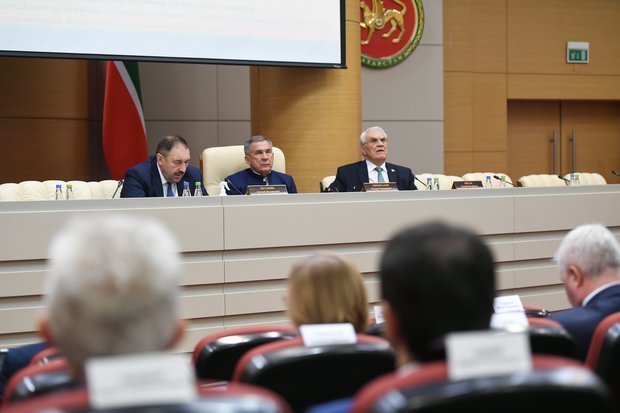
Minister of Agriculture and Food of the Republic of Tatarstan Marat Zyabbarov said that 400 hectares were sown last year, in the future it is planned to sow 740 hectares with this crop. Federal subsidies are allocated for each hectare.
“There are people to work on farms, but the equipment is very expensive," he complained. “The Russian harvester for harvesting costs 29 million rubles, and the Belgian one is even more expensive. In addition, employees of the Ministry of Internal Affairs control the passage of each batch. In a word, cannabis gives a lot of trouble to the villagers," he noted.
Nevertheless, the president asked to carefully calculate the “economy”.
“The gunpowder plant now has a great need (for cellulose — author's note), and we can reach large volumes," he explained. “This is strategic material for the defence industry. Let's create a programme with them?
It is assumed that the participants of the programme will be the Kazan Gunpowder Plant FSUE and GosNIIHP FSE.